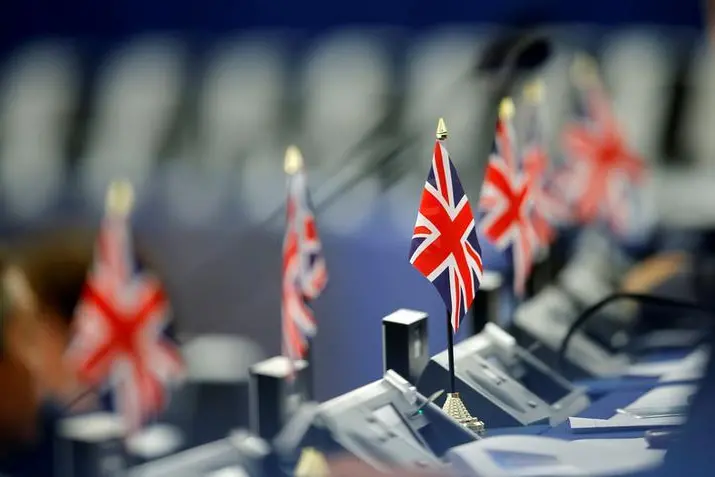PHOTO
* UK to warn it may deviate from Brexit deal
* Frost says: Things have to change
* Frost says: All options on the table
(Adds comments from UK minister Frost)
BRUSSELS/LONDON, July 19 (Reuters) - Britain will threatenthis week to deviate from the Brexit deal unless the EuropeanUnion shows more flexibility over Northern Ireland, one UK andthree EU sources told Reuters, a move that could thrust thefive-year Brexit divorce into tumult.
Deviating from the deal's so-called Northern IrelandProtocol is a risky step: its aim was to prevent Brexit fromdisrupting the delicate peace brought to Northern Ireland by theU.S.-brokered 1998 agreement that ended three decades ofsectarian conflict.
Prime Minister Boris Johnson, who signed the 2020 Brexitdeal, has been dismayed by the protocol which has imposedpaperwork and checks that London says could prevent British foodstaples such as sausages going to Northern Ireland.
David Frost, the British minister who leads Brexitnegotiations, is preparing to announce a significant potentialchange on the protocol that could have far-reaching consequencesfor the relationship with the EU, one of the sources said.
The plans are being worked on by Downing Street. Frost isdue to update parliament on Wednesday about Northern Ireland andBrexit, and will also present a paper on Brexit to lawmakers.
After the Reuters report, Frost told lawmakers the protocolwas not sustainable in its current form and that if an agreementcould not be reached then London would consider all options,including unilateral action through Article 16 of the protocol.
"All options are on the table," Frost said, when asked if hewould consider triggering Article 16. "We've said it's notsustainable in the way it's working at the moment, things havegot to change."
Frost said it was not yet clear whether or not a fundamentalrebalancing of the protocol was possible.
Brussels expects Frost will push for a deviation from theprotocol unless the EU agrees to compromise, said an EU diplomatwho was briefed on talks with British negotiators.
"We will not agree to the reopening of the Irish protocol,"said a third source, a senior EU official.
Britain is expected to go beyond its demands for changes toveterinary rules. The senior EU official and a second EUdiplomat said that London would seek to have the European Courtof Justice (ECJ) removed from the arbitration process.
Preserving the peace in Northern Ireland while protectingthe EU's single market but without dividing up the UnitedKingdom was always the most difficult riddle of the Brexit sagasince the 2016 referendum.
NORTHERN IRELAND
Since the United Kingdom exited the bloc's orbit on Jan. 1,Johnson unilaterally delayed the implementation of someprovisions of the protocol and Frost has said the protocol isunsustainable.
Frost is insisting on a bespoke veterinary deal based onequivalence which London says would remove the need for controlson goods crossing from Britain to Northern Ireland.
Britain is arguing that there should be a more flexibleapproach to agri-food rules to limit the impact on everydaylives and will spell out clearly what the options and risks are.
The 1998 peace deal largely brought an end to the "Troubles"- three decades of conflict between Irish Catholic nationalistmilitants and pro-British Protestant "loyalist" paramilitariesin which 3,600 people were killed.
An open Irish land border is seen as crucial to the spiritof that deal by aiming to safeguard peace, free trade and travelon the island.
But that became a problem after the 2016 Brexit vote. The EUcould not close the land border between Northern Ireland andIreland but feared it could become a backdoor into the EU'ssingle market.
The result was the 63-page "Protocol on Ireland/NorthernIreland", which effectively keeps Northern Ireland in the EU'ssingle market for goods and having Northern Ireland apply EUcustoms rules at its ports.
But by putting checks on some goods crossing betweenmainland Britain and Northern Ireland, many pro-Britishunionists say the protocol has breached the 1998 peacesettlement.
Loyalist paramilitary groups told Johnson in March that theywere temporarily withdrawing support for the peace agreement dueto concerns over the Brexit deal.
(Writing by Gabriela Baczynska and Philip Blenkinsop inBrussels and Guy Faulconbridge in London; additional reportingby William James; Editing by Andrew Heavens, Catherine Evans andToby Chopra) ((guy.faulconbridge@thomsonreuters.com; 07825218698;))





















